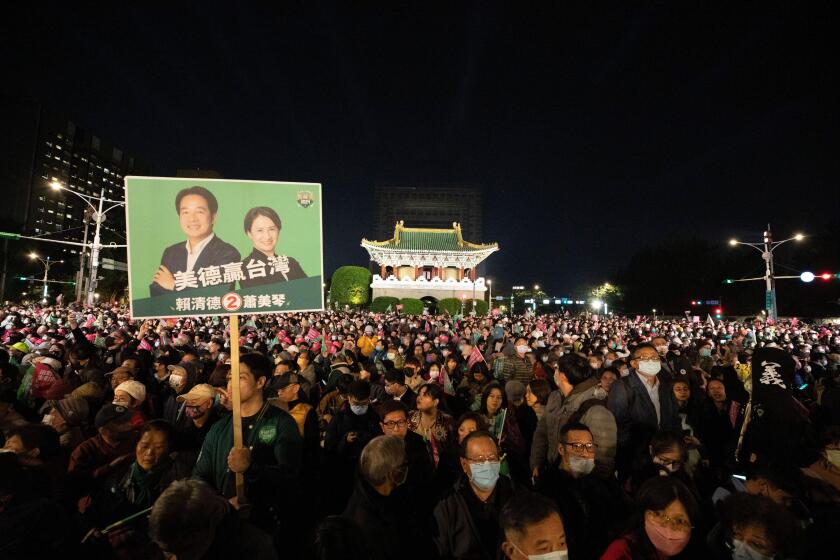Europe’s debt capital markets have sailed through their first geopolitical test in a year full of them, as they proved unexpectedly resilient this week when China’s least favourite option was voted in as president of Taiwan. This benign mood is unlikely to last.
Last weekend Taiwan went to the voting booth, and Lai Ching-te of the Democratic Progressive Party won, with a slim 40% of the vote.
Lai has called for Taiwan’s independence, though has since moderated this stance. Nonetheless, there was an immediate backlash from Beijing and China publicly reiterated that it will continue plans for eventual reunification.
For Europe’s capital markets, this was on paper a higher risk outcome from the election. In the second half of last year, multiple syndicate bankers had started raising concerns that a Taiwanese election that put Taiwan at odds with the Communist Party of China could widen European spreads and even make it more difficult to issue bonds.
One mitigating factor is that Lai's Democratic Progressive Party lost control of parliament, meaning it will have to cooperate with other parties whose positions are more acceptable to China.
Whether because of this or not, the feared market sell-off did not materialise. On Monday, two days after the votes were counted, the iTraxx Europe Main and Senior Financials Indices opened 1bp wider than their Friday closes, while the Crossover was 10bp wider. These are not unusual moves over a weekend.
Monday’s primary market was no slouch. Santander issued a €1.25bn 10.25 year non-call 5.25 year tier two bond that attracted €4bn of orders and was hailed as a “blowout”. In the corporate bond market, Enagas and Iren had no problem tightening the screws on investors, each issuer moving the spread on its deal by more than 35bp during bookbuilding.
One down…62 to go
So the European markets appear to have got over their first election hurdle. But there are many more to come. Roughly half the world’s population heads to the polls this year, with at least 62 more countries holding national elections and the European Union voting for the European Parliament. There have never been so many people voting in one year.
But while Taiwan’s elections have proved uneventful as far as Europe’s capital markets go, it is unlikely the market’s insouciance towards politics will last.
January is almost a separate market from the rest of the year, as far as issuance goes. Investors begin the month with their accounts bursting with cash, market convention means they get into the office every day expecting to invest and borrowers are used to piling in to get their year's funding off to as strong a start as possible.
The only other comparable period in the issuing year is September, when the market returns from its summer holiday looking for action.
Between February and June, there will be 14 major elections in Europe, including a general election in the UK and the EU vote.
Investors have far less impetus during those months to risk getting on the wrong side of political risk than they do in January.
The Trumpets sound
The big election this year in capital markets terms, as well as many other, is the US presidential election in November. Incumbent Joe Biden will go up against the Republican candidate. Ex-president Donald Trump took another step towards becoming the contender this week, after he won the Iowa caucuses, thrashing his Republican opponents.
With most votes counted, Trump had 51%. Second placed Ron DeSantis had around 21%.
A second Trump term would be a statement of intent about what the US wants and expects from its place in the world. Trump was impeached for inciting insurrection, slashed more than 100 environmental regulations, withdrew from multilateral agreements and signed an executive order that specifically targeted people from a single religion from travelling to the US.
If the US voters, knowing all this, reinstall Trump in the most powerful seat in the world, all bets are off. Political risk will be such a real part of the Western capital markets that entire days or even weeks could become inhospitable to issuance.
Something as simple as a second term President Trump using social media to incite a trade war with China — something he did during his first term.
Unlike during Trump's first term, however, central banks have now turned off the taps pumping money into the bond market. The $2.45tr of domestic debt the US Federal Reserve bought in the first six months of Trump’s first presidency will not be repeated.
And all of this without even a mention yet of the two major wars happening in the Middle East and Ukraine.
Catastrophe fatigue
There is an argument that by the end of this year, investors will be facing catastrophe fatigue. And to be clear, Trump getting a second term would be a catastrophe.
Catastrophe fatigue is a phenomenon emerging market investors are well versed in —where so many bad things happen in a row that overwhelmed investors stop caring about any of it. Otherwise, they would never have the courage to invest at all.
For emerging market investors, this is part of the cut and thrust of their market. And it is one reason why EM bonds often pay significantly more yield than other markets.
No one gets involved with a BBB+ senior bond from a German company because they want to hone their ability to ignore catastrophes. But as the year goes on, that is what markets face.

